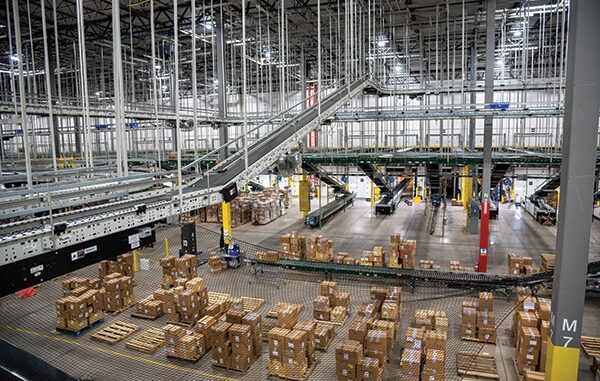
Estimated reading time: 10 minutes
American Eagle Outfitters clearly cares about its image. Rainbow merchandise lights up the website for Pride, and banal advertisements about diversity and inclusion sit alongside photos of smiling models enjoying time at the beach. That’s not the American Eagle the warehouse workers in Ottawa, KS know. That’s not the American Eagle they’ll tell you about.
What is it like in the warehouse? The mood is somber and depressed. We joke daily about suicide: “Maybe I’ll jump off the Mod” — that’s the 50-foot tall platform pickers stand on — “or jump in front of the forklift.” There’s no beach here. We bond on the gallows.
Our days are tedious, physically painful, crushingly boring. Your department is chosen by day and when you get there, you either walk or stand in one place for ten to twelve hours. You’re given two breaks and not a minute more. The work is both physically exhausting and psychologically violent. Many of us go home each day limping and sore. Old, disabled, and pregnant workers are forced to struggle for the handful of promotions to jobs where they can occasionally sit down.
But if you haven’t heard much about the conditions inside of AEO’s warehouses, you’re not alone. That’s no accident. The company’s employee handbook sets out draconian rules for how workers are allowed to talk about the company, during and after employment, essentially muzzling workers who dissent.
“When they first rolled out the video, I could tell just by looking at it that this wasn’t going to work.”
Last year, American Eagle spent over a million dollars to “modernize” its crumbling warehouse. Part of this “modernization” was the installation of a new, automated packing system designed to replace skilled labor — the company bragged that workers could be trained on the new system in “about five minutes.” The system, from U.K. packing corporation B.G., adds hours of work on the front and back end to prepare items for automation and to receive and sort what comes out the other end. It has made the already-fungible packers even more replaceable, certainly one of the goals of the American Eagle execs who paid for it. But it’s also plagued by glitches, which causes the system to stall out many times during each shift.
This money could have been spent repairing the dozens of holes in the ceilings in both buildings, which leak water into the warehouse every time it rains. This apparently isn’t important enough for American Eagle to consider fixing. Every time it rains, enterprising maintenance workers are forced to place individual trash cans under the holes.
The money could also have been used to fix the warehouse’s forklift shortage. Multiple forklifts have to be “Locked-Out, Tagged-Out” — the industrial procedure for locking and labeling broken or otherwise unsafe equipment to prevent injury to those attempting to use them — every shift. The company finally attempted to remedy this a year ago, but did so in the most incompetent way possible, which, as any long-term AE worker will tell you, is standard procedure. Without speaking to a single forklift operator, the company purchased several used forklifts from the bankruptcy sale of another corporation. These forklifts are practically useless, save for one model (called a “pacer” in the warehouse), that we in fact did not actually need more of. The rest are incompatible with the warehouse in some way. Even a brief trip through the warehouse would have shown the execs that these machines wouldn’t work. Some are too tall, others too short; they are universally the wrong size. Even the new Crown batteries are incompatible with our old Raymond forklifts. These “new” forklifts are now sitting in the back of the warehouse, gathering dust.
Our supervisors are petulant dictators, petty tyrants who harass subordinates that have no recourse. Supervisors and leads split up friends and partners into different departments, give their preferred subordinates favorable jobs, punish workers they don’t like with the unpopular work, and gossip about subordinates behind their backs. Managers and supervisors promote friends and relatives, leaving loyal, knowledgeable workers to languish in the same menial tasks for years. Of all the indignities the overseers visit on the workers, surveilling them — watching them as they work — is among their favorite Some are known to stalk the Mods and packing rows, keeping an eye out for workers who might take a break from their monotonous jobs for the momentary respite of each other’s company. Their power being both arbitrary and immense, some supervisors punish chatting — others let their favorites talk at work, while cracking down on everyone else. Workers worry about the “higher-ups breathing down [their] necks”, and check over their shoulders every few minutes for fear of accusation that they’re off-task.
In the picking department, a computer program monitors workers’ every move and flags their username to their leads if they’re seen as “idle” for five minutes. Having too much “gap time” (usually defined as 60 minutes or more total during a 12-hour shift), results in punishment from the harsher overseers. We’re given stringent quotas to meet, and a culture of hyper-competition is fostered among the warehouse workers. We are often afraid to go to the bathroom or to get water.
This culture of total top-down hierarchy instills a sense of hopelessness, numbness, complacency, and apathy in workers. When asked their feelings on a new punishing policy or arbitrary rule, most will shrug their shoulders in defeat. “It is what it is.”
Harassers, abusers, and other assorted pests get a general pass in the warehouse, especially if their production is good. One maintenance technician was known to make cruel sexist “jokes” and anti-woman comments for years before finally being fired for an unrelated infraction. A lead that was known for sexual harassment was simply shuttled to a different department with fewer women for him to target. A date-rapist was merely moved to a different shift from his victim. A harasser who stalked a coworker online and made disgusting comments about her body at the workplace was simply told to stop by the HR department. He still works here.
American Eagle relies on staffing agencies so they don’t have to hire full time employees who might qualify for benefits. Many of these workers are Latinx and primarily Spanish-speaking. This makes it harder for them to stand up against the mostly white, English-speaking leads and supervisors. Spanish-speaking associates are left to flounder, as the company relies on bilingual full-time workers to do the work of a translator in addition to their regular duties, without any extra pay.
These temporary workers are separated from us full-time workers in every way possible: separate lockers, segregated work meetings, and special badges. Other workers refer to these temporary workers with scorn and reflexively blame them for malfunctions. Racism simmers just under the surface. There are loud questions about the immigration status of the Black and Latinx temporary workers. Having someone lower in the hierarchy gives folks someone to direct their hate towards, and makes it so the shit the bosses give them can roll onto someone else.
Workers regularly take out their anger on each other. Snide comments and toxic competition dominate conversation. Since workers are expected to conform to rigid production standards, they often vent their anger towards teammates who work slower than they do, accusing them of dragging down their “numbers” or “not pulling their weight.” Accusations of laziness float in the air like a thick smog, shaming workers who don’t — or can’t — make quota. Many workers suffer fatigue, illness, pain, anxiety, and desperation in silence, for fear of being labeled “lazy” by their supposed teammates.
Despite making impressive profits, the company always manages to find ways to underpay their employees. This year, they announced employees will not receive their yearly bonus. The yearly 3% raises are quickly eaten up by inflation.
Overworked trainers are forced to push new workers through training in a matter of days, sometimes hours. The workers are then, predictably, anxious and unsure of themselves, and then make simple errors that create difficulties further down the line and can sometimes result in punitive actions towards the trainees.
Group leads and operations clerks are increasingly placed into production roles, or are forced to do jobs that would have been handled by other associates, in addition to their regular duties.
“At least it’s better than Wal-Mart!” has been the rallying cry of the desperate workers. Ottawa, Kansas is a warehouse town. The American Eagle warehouse stands on one side, the Wal-Mart Distribution Center on the other. Just next door to our warehouse is Schuff Steel, the place of nightmares, known for the abuse heaped upon its workers. With those options to choose from, American Eagle once looked like paradise.
But over the years, American Eagle has started to look more like a Wal-Mart or Amazon warehouse. Years ago, American Eagle boasted two 20-minute breaks and a 45-minute lunch on a 10-hour shift. Today, a worker on a 10-hour shift gets only two breaks: a 30-minute break and a 25-minute break. In a 12-hour shift, you have to work for four hours straight. Today, more and more of the American Eagle workers are going across town. Might as well work at the Wal-Mart — at least they pay better for what has become the same misery.

